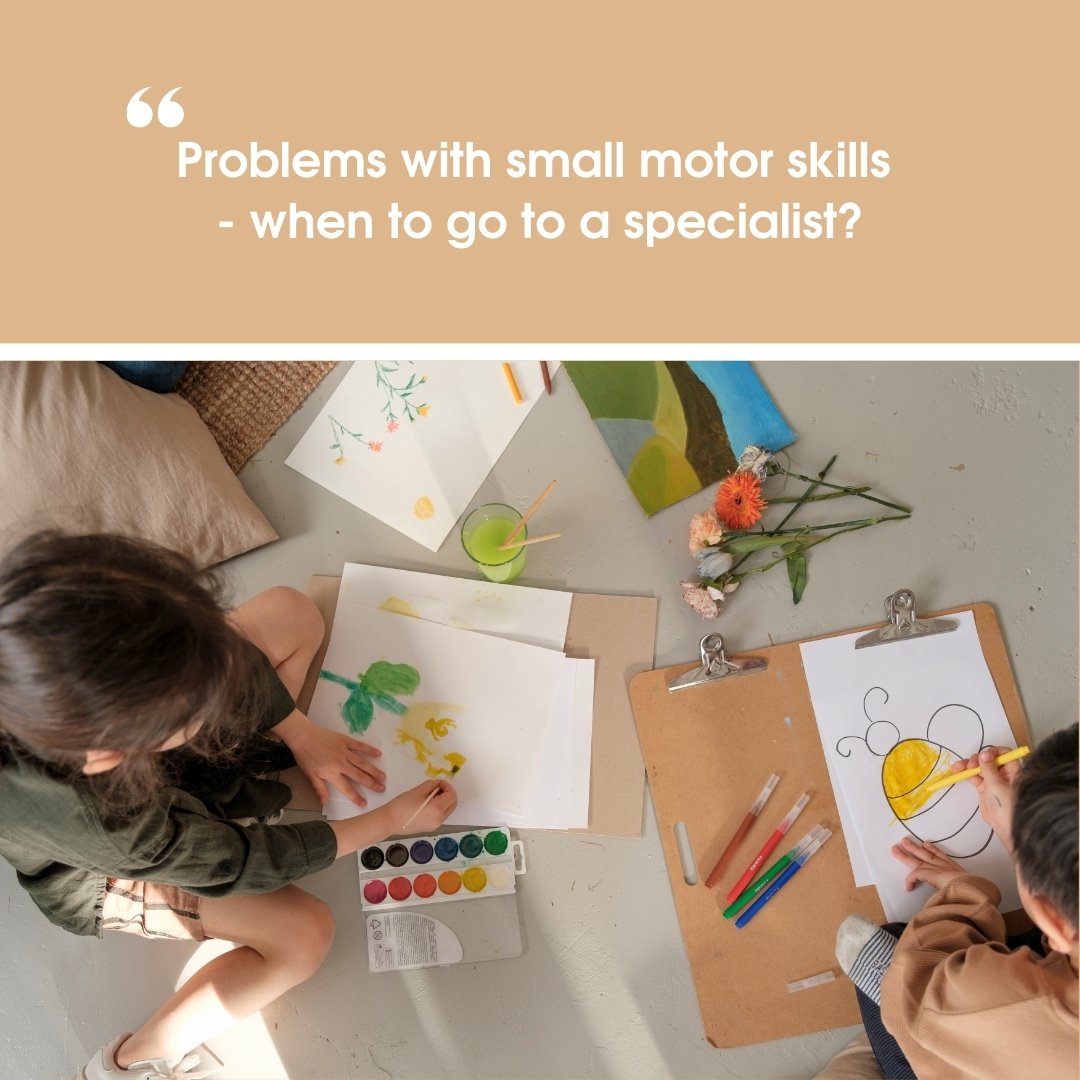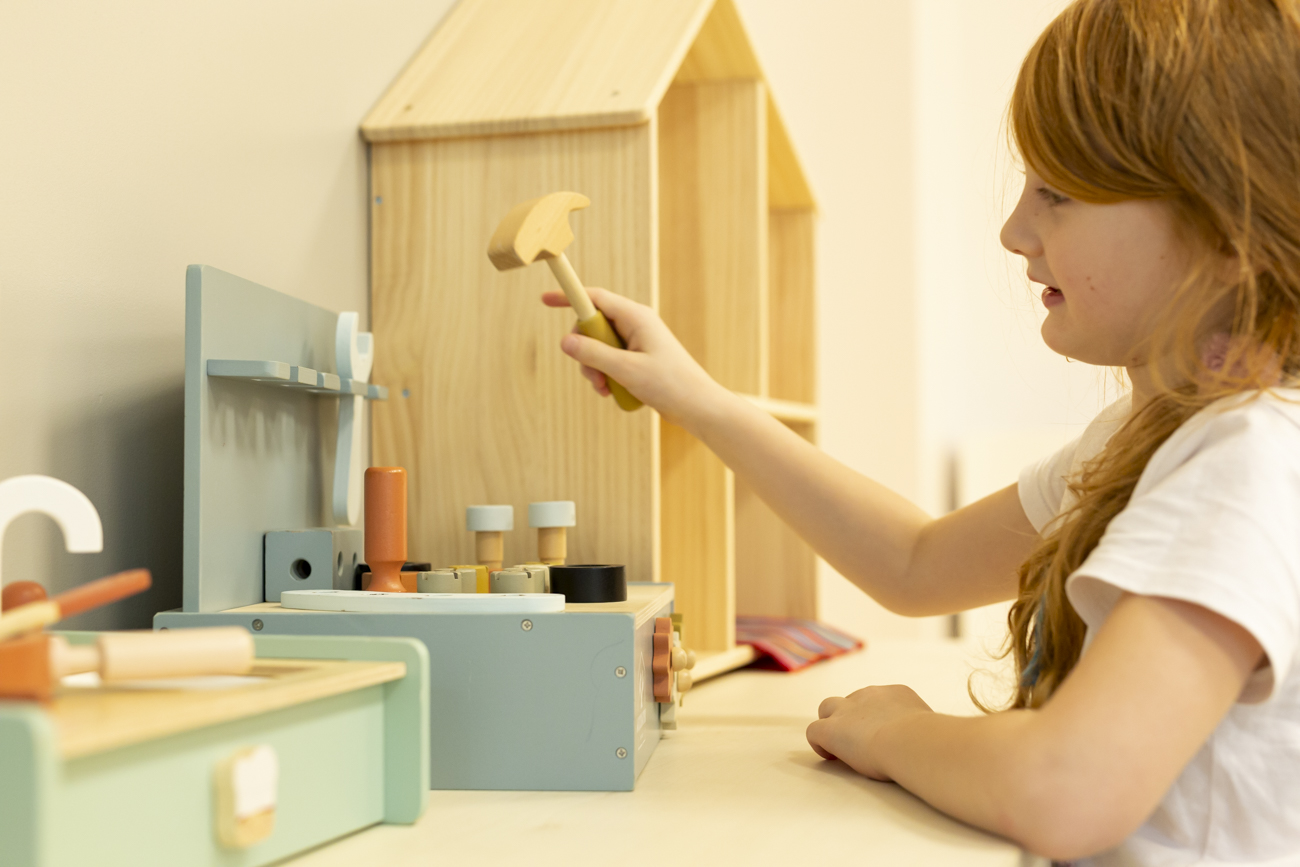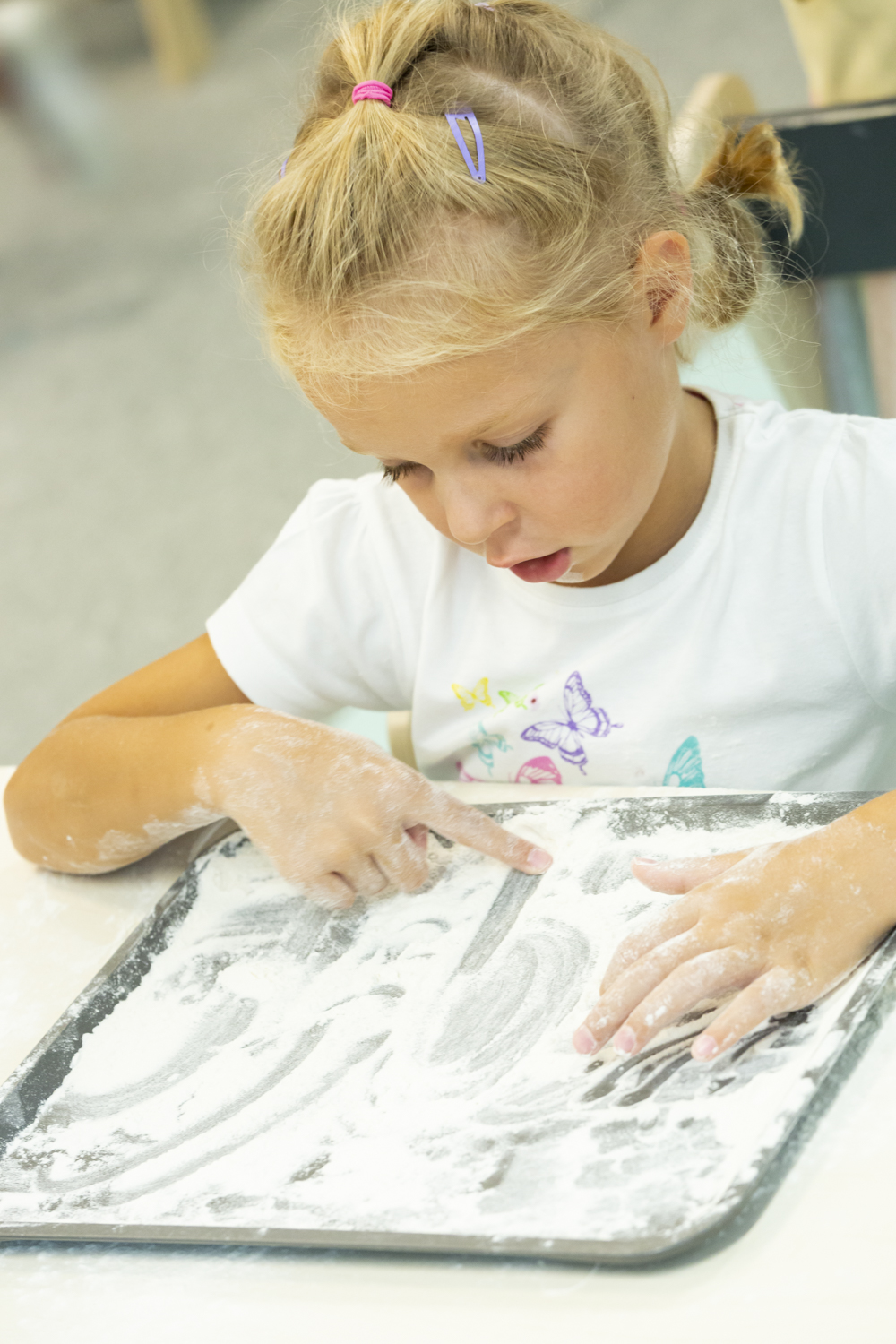Fine Motor Problems – When to See a Specialist?

What is fine motor skills and why is it important?
Fine motor skills refer to the ability to perform precise hand and finger movements that allow us to carry out daily tasks such as writing, buttoning clothes, drawing, cutting, or manipulating small objects. The scope of fine motor skills also includes coordination between both hands, hand muscle strength, control over pressure, and the ability to perform precise manipulations (upper limb movements). Proficiency in this area is crucial for a child’s independence, academic success, and overall motor coordination.

How to recognize problems with fine motor skills?
Symptoms of delayed or disrupted motor development can be observed in early childhood, initially in the form of difficulties with gross motor skills and self-care activities. Gross motor skills involve movements that engage large muscle groups responsible for coordination, balance, and overall physical fitness. Then, it becomes apparent that the child has trouble with fine motor tasks related to hand dexterity, such as writing or drawing.
When a child has trouble with fine motor skills, action should be taken. How to recognize if a child’s motor development is disrupted? With proper observation, you may notice concerning signs such as:
- Difficulty grasping, moving hands, and manipulating small objects.
- Clumsiness in tasks requiring precision, e.g., drawing, coloring, cutting.
- Avoidance of manual activities, such as molding with clay, assembling puzzles, or playing with blocks.
- Problems with buttoning clothes, tying shoelaces, or using cutlery.
- Weak hand strength – quick fatigue during writing or drawing.
- Excessive muscle tension or, conversely, weakness in hand muscles.
- Delayed development of praxis, i.e., the ability to plan and perform purposeful, coordinated movements. This is a key motor function that allows for performing new, learned activities throughout life, such as dressing, writing, drawing, or manipulating objects. Praxis disorders can cause difficulties in learning everyday tasks, even if the child has appropriate muscle strength and physical fitness.
- Difficulty coordinating hand movements during physical and manipulative play.
- Reluctance to touch new and varied textures.
- Disruptions in muscle tone (lowered, elevated, or variable).
- Preschool and/or school difficulties related to reduced manual dexterity.
- Speech therapist issues concerning the speech apparatus and the child’s speech development.
- Emotional responses such as frustration or negativity resulting from effort put into manual tasks.
In KIDS&Co. preschools, teachers working with children conduct systematic observations. They pay attention to the child’s functioning and elements of development from physical, emotional, social, and cognitive perspectives. The results are recorded in a portfolio, which is regularly presented to parents during individual meetings. Many of the teachers employed in KIDS&Co. institutions have completed the “Hand Diagnosis and Therapy Level I and II” course, ensuring that our preschoolers receive current, individualized support.
Dyspraxia in children (Clumsy Child Syndrome) – When should you pay attention to movement planning issues?
Dyspraxia, also known as Clumsy Child Syndrome, is a disorder of movement planning and coordination that can significantly affect the development of fine motor skills in children. It manifests in difficulties performing sequential, precise movements, even when the child has adequate muscle strength. Children with dyspraxia often have trouble with tasks such as tying shoes, drawing, writing, or using cutlery. Their movements may seem clumsy, and learning new manual activities takes them more time than their peers.
These disorders arise from difficulties in processing sensory stimuli and translating them into specific movements. Children with dyspraxia may also avoid activities requiring precision, get frustrated quickly, and exhibit lower self-confidence in manual tasks. It’s important to remember that dyspraxia often coexists with other difficulties, such as dysgraphia or sensory integration disorders. Early diagnosis and appropriate exercises to develop motor skills, led by a hand therapist or sensory integration specialist, can significantly improve the child’s physical abilities and overall functioning in daily life.

Suspect a fine motor problem in your child? When should you consult a specialist?
If you notice or are informed by the teacher that your child has difficulty performing precise movements and these issues persist for an extended period, it is worth consulting a specialist. How do you diagnose your child’s difficulties? Pay special attention if:
- The problems persist despite regular exercises and support from preschool and parents.
- The child avoids manual activities and shows frustration when performing them.
- Fine motor difficulties affect their functioning in preschool.
- Other concerning symptoms occur, such as movement coordination issues or problems with muscle tone.
- To help your child and ensure proper motor development, consult a specialist who will assess the child’s visual-motor coordination difficulties and recommend appropriate motor development exercises.
Take care of your child’s fine motor development. Who to turn to when the child has problems?
If a child has difficulty with motor coordination and shows signs of disrupted fine motor development, it is worth consulting with:
- A sensory integration therapist – if motor problems arise from difficulties processing sensory stimuli, sensory integration therapy is the best choice.
- A pediatric physiotherapist – if there are issues with muscle tone or motor coordination.
- A hand therapist – a specialist focusing on hand motor skills, improving precise hand and finger movements, and upper limb coordination.
- A child psychologist – if the difficulties impact the child’s life, self-esteem, and social functioning.
- A special education teacher – if motor issues hinder learning and daily preschool activities.
Motor development is extremely important for a child’s proper growth. If we notice that a child has motor difficulties, it’s important to react promptly.
How to support your child at home in fine motor development?
Daily exercises to develop fine motor skills at home are key to improving motor proficiency and proper upper limb coordination. Here are a few tips:
- Encourage your child to engage in physical play that involves hand use and strengthens hand dexterity, such as molding with clay, building with blocks, or transferring small elements.
- Perform activities together that require precise movements.
- Use games that strengthen hand muscles, such as squeezing sponges, using pipettes, or threading beads.
- Gradually increase the difficulty level of exercises to develop fine motor skills, so your child can develop their abilities without frustration.

Summary
Fine motor problems can hinder a child’s daily functioning, affecting their physical abilities, self-esteem, and learning outcomes. It’s important to carefully observe children’s motor development and respond to difficulties, especially if there are signs of dyspraxia, dysgraphia, or sensory integration disorders.
Early diagnosis of a child’s difficulties and appropriate exercises to develop motor skills can significantly improve visual-motor coordination, fine motor planning, and movement precision. Support from specialists, such as a hand therapist or pediatric physiotherapist, will help tailor therapy to the child’s needs. The sooner we take action, the easier it will be for the child to overcome difficulties and develop motor skills.
Learn more about the KIDS&Co. kindergarten and nursery program. Our facilities are located in the following cities:
- private preschools and nurseries in Warsaw
- private preschools and nurseries in Wrocław
- private preschools and nurseries in Gdańsk
- private preschools and nurseries in Łódź
- private preschools and nurseries in Kraków
- private preschools and nurseries in Katowice
- private preschools and nurseries in Poznań
- private preschools and nurseries in Suwałki
- private preschools and nurseries in Ostrów Mazowiecka
Let’s meet!
We invite all of you to an individual meeting with the headteacher. This will be a great opportunity to find out about our educational offer, ask questions, and visit the kindergarten. You can book one visit for a given day.












